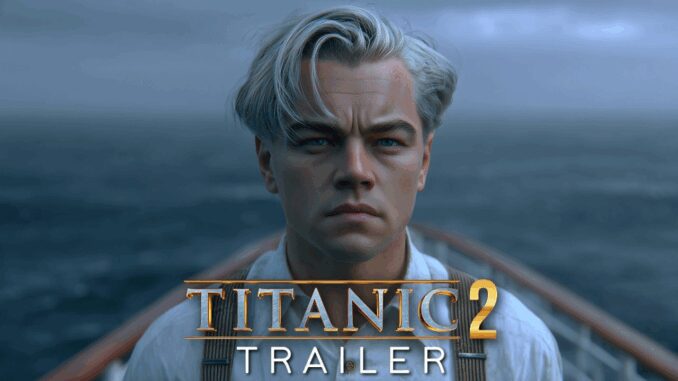
The screen flickered, a sudden intrusion of a title card against a digital black void: "TITANIC 2 Official Concept Trailer 2026." A collective gasp, perhaps more internal than external, rippled through the imagined audience. The sheer audacity of the premise, the impossible promise of it, was enough to seize attention. But then, the next line: "Starring Leonardo DiCaprio and Kate Winslet." It wasn't merely a concept; it was a cinematic necromancy, a deliberate tug on the heartstrings of a generation.
The trailer, presented as a highly stylized, almost melancholic montage, unfolded. It opened not with a ship, but with water – vast, dark, churning, an indifferent canvas. The familiar, haunting strains of a cello, a spectral shimmer of James Horner's iconic score, began to weave itself into the soundscape, quickly overtaken by the deep, resonant thrum of modern engines. This wasn't the slow, elegant sweep of the original, but a sleek, almost predatory hum.
Then, the ship. Not the Titanic, but its spiritual successor. The "Oceanus II," perhaps, or "The Sovereign." A vessel of impossible luxury, far grander, far more technologically advanced than its predecessor. Glass-bottomed pools overlooking the abyss, bioluminescent promenades, AI-driven navigation systems promising absolute safety. Shots of opulence flashed – champagne flutes, soaring atriums, laughter echoing through futuristic lounges. There was a subtle unease in these visuals; a perfection that felt almost defiant, an implicit challenge to the very forces that doomed the first.
A voiceover, deep and gravelly, began to speak: "They said it couldn't happen again. That humanity had learned." The words hung in the air, a familiar echo of hubris. Quick cuts then, like flashes of a dream: a hand tracing a frosted window, but this time, the glass held a digital display. A glimmer of an iceberg, not a massive, stoic wall, but a fragmented, almost crystalline threat in the distance. The sound of ice groaning, not the slow, tearing sound of rivets, but a sharper, more brittle snap, like glass under immense pressure.
And then, the moment. The camera panned slowly across a crowded observation deck. A woman, her face etched with wisdom and a quiet strength, stood by the railing, gazing out at the twilight sea. Her hair, now a rich auburn, was swept by the wind. It was Kate Winslet, undeniably, but older, her eyes holding a depth of experience that Rose DeWitt Bukater could only dream of. She wore the uniform of a ship’s designer, perhaps, or even a captain – a figure of authority, not merely an adornment.
Her gaze shifted, catching someone across the deck. A man, his hair slightly dishevelled, a hint of weariness in his eyes, but still possessing that unmistakable intensity. Leonardo DiCaprio. Not a carefree artist, but perhaps an investigative journalist, or a specialist brought in to consult on the ship’s safety – a man haunted by history, aware of the dangers lurking beneath the surface of glittering progress. Their eyes met across the throng, and in that brief, electric moment, it wasn't Jack and Rose, but the ghosts of them, their chemistry undeniable, their connection immediate and profound, carrying the weight of an entire cinematic legacy.
The music swelled, a contemporary orchestral piece interwoven with the phantom notes of "My Heart Will Go On," distorted, almost sorrowful. The cuts became frantic: digital alarm bells flashing across touchscreens, a crack spider-webbing across a reinforced window, water beginning to seep into a pristine hallway, not as a gentle flood, but as an aggressive, technological breach. The "Oceanus II" tilted, its sleek lines suddenly betraying a terrible vulnerability.
The final sequence: DiCaprio’s character reaching for Winslet’s, their fingers brushing as chaos erupted around them. Not a desperate plea for survival, but a look of shared understanding, a recognition of an inevitable fate repeating itself. The voiceover returned, a chilling whisper: "Some stories… demand to be told again." The screen went black, then a stark white title: "TITANIC II." Beneath it, a date: "2026." The "md02" tag, almost an afterthought, a digital fingerprint of its illicit preview.
This "concept trailer" is more than just a tease for a potential film; it's an illustrative essay in itself, a commentary on our enduring fascination with the Titanic legend and our relationship with cinematic legacy. The immediate impact lies in its audacious use of DiCaprio and Winslet. They are not merely actors reprising roles; they are cultural touchstones. Their presence signals a continuation, not of Jack and Rose's literal story, but of their thematic essence. They embody the memory, the "what if," and the cyclical nature of human ambition and tragedy. Their age adds gravitas, suggesting not a young, naive love, but a seasoned wisdom confronted by the same, yet technologically amplified, folly.
The trailer illustrates our collective memory and the power of nostalgia. By hinting at a new ship, a new disaster, it forces us to confront whether humanity truly learns from its past. Is "Titanic 2" merely a cynical cash grab, or could it be a profound examination of our modern world – our reliance on technology, our environmental complacency, our continued hubris in the face of nature’s indifference? The subtle suggestion that this new tragedy is born not of primitive engineering failure but perhaps a glitch in an overly complex system, or the direct consequence of a changed climate, adds a chilling contemporary layer.
Ultimately, the "Titanic 2 Official Concept Trailer 2026 Starring Leonardo DiCaprio and Kate Winslet md02" isn't just about a potential sequel. It's a mirror held up to our own desires for reinvention, our yearning for familiar faces in new narratives, and our perpetual, uncomfortable dance with the echoes of history. It illustrates the enduring power of a story that, like an iceberg, continues to shape the waters of our imagination, reminding us that some sagas, even those seemingly laid to rest, always have the potential to resurface, carrying with them the weight of both promise and impending doom.
